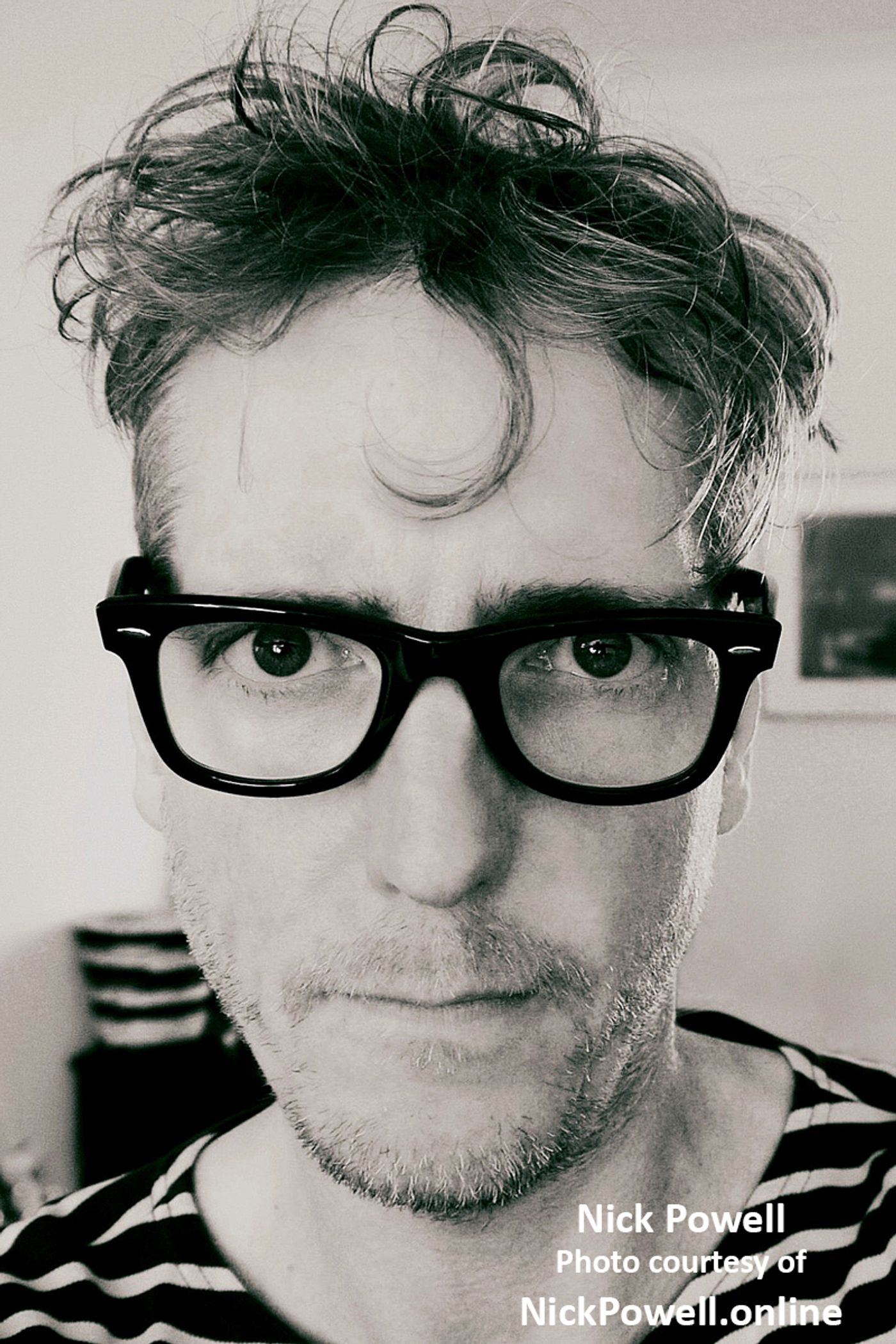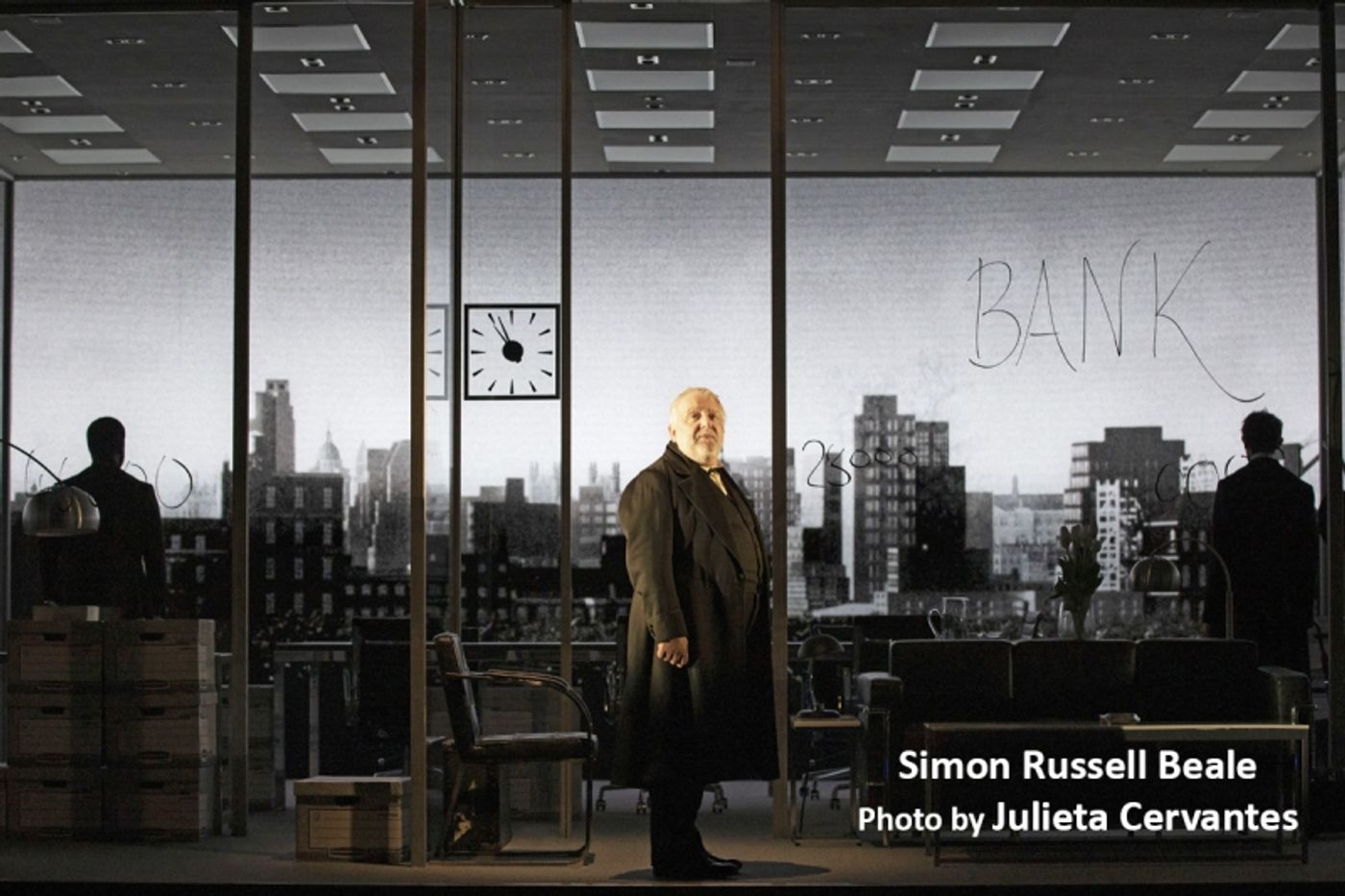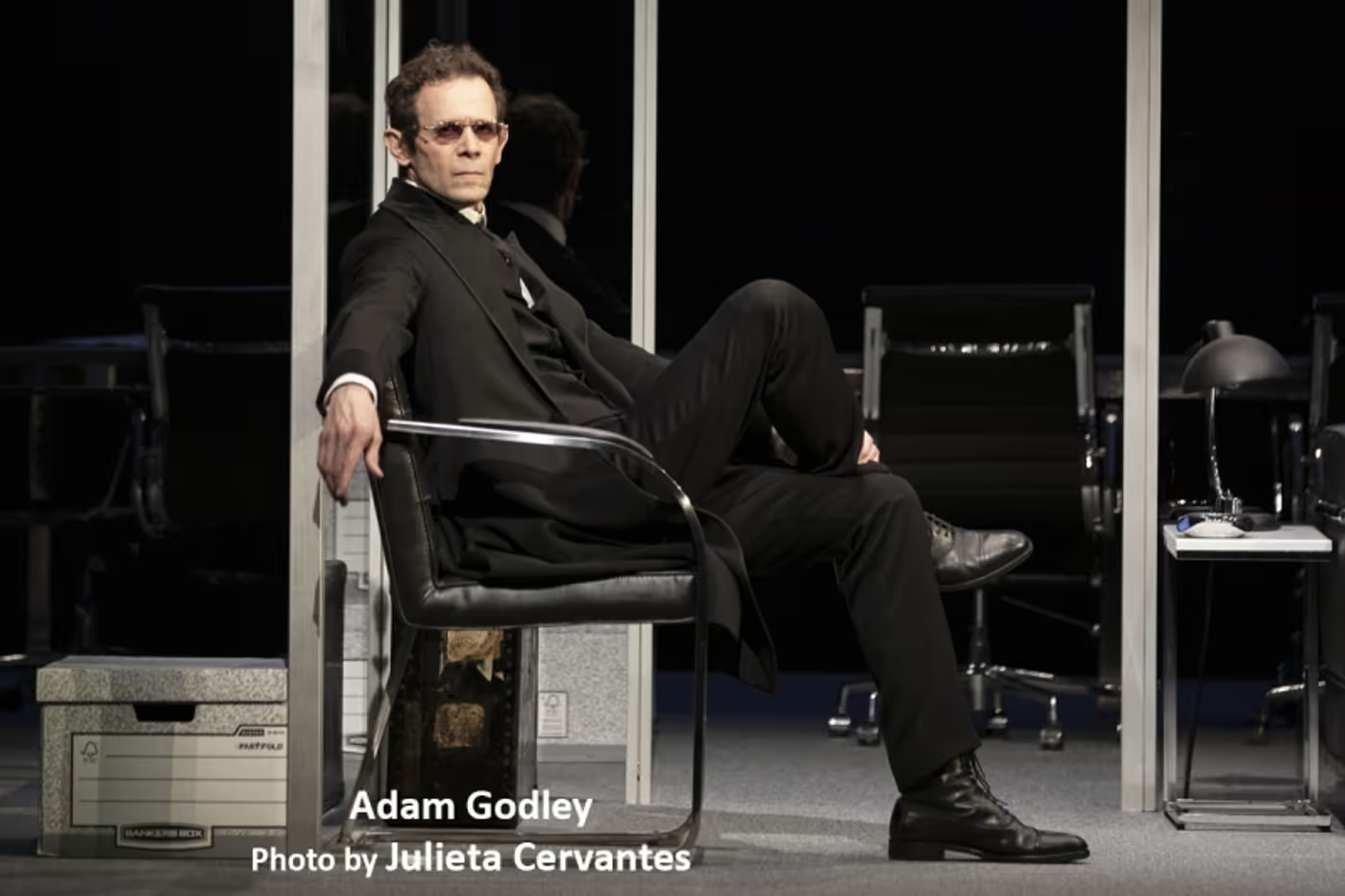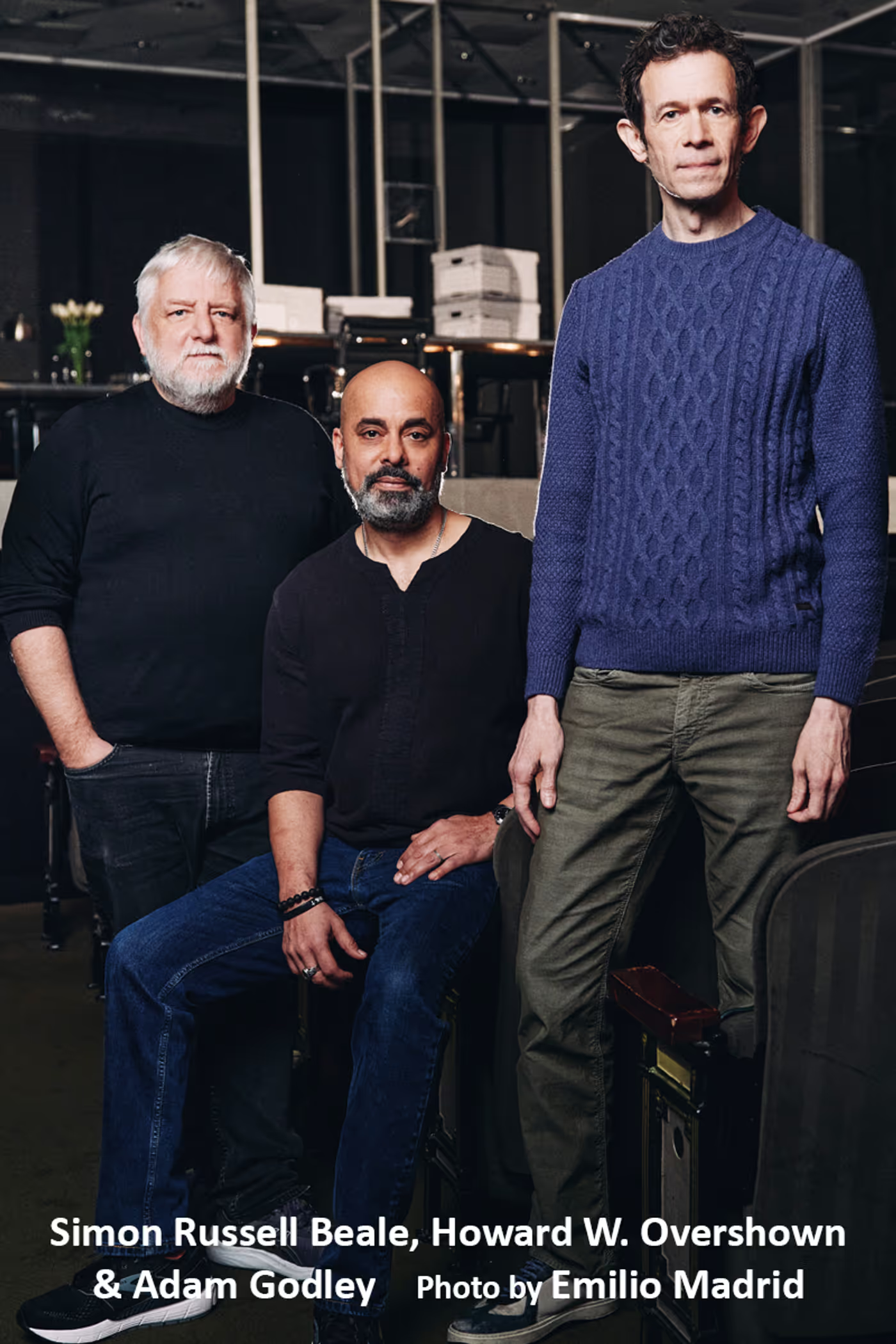Interview: Composer/Sound Designer Nick Powell Making Integral Music For THE LEHMAN TRILOGY
The critically acclaimed The Lehman Trilogy opens March 6th at the Ahmanson after its successful runs on Broadway & the West End

The critically acclaimed The Lehman Trilogy opens March 6, 2022, at the Ahmanson after its successful runs on Broadway and the West End. Multi-award-winning Sam Mendes directs Simon Russell Beale and Adam Godley reprising their Broadway roles, with Howard W. Overshown who understudied in the Broadway production. Playwright Ben Power has adapted Stefano Massini's original script on the deep-dive history of the Lehman Brothers investment banking company.
I had the opportunity to speak with The Lehman Trilogy's composer/sound designer Nick Powell just before going into dress rehearsal.
Thank you for taking the time for this interview, Nick! How are you doing today?
Okay, thanks. I'm in the theatre getting ready for our first dress rehearsal.
You're in L.A. then?
I'm in L.A. Good to be here!
You originally composed the score for The Lehman Trilogy in 2018 for its National Theatre production. Whose idea was it to add a score which turned out to be the fourth actor in this three-actor play? Sam Mendes or Ben Powers?
There was always going to be music in the show, I think. It was Sam's idea to reduce it to just a piano and a live pianist. What happened was I set up a piano in rehearsals, at least at the beginning. I just improvised as they were doing the scenes. Sam would look at me when he wanted some music. I literally just make stuff up. That stuff gradually became more shaped over time. I think probably what happened was we realized that just because of the form of the play, the role of the music became very integral to the way we were telling the story. Also through the nature of our rehearsal room that we were in there all together all the time, it felt very much like a process that we were making the show up all together. We weren't just following a script; the script was being edited. Actors were coming up with interesting ways to solve the problem of playing, I can't even remember how many characters, like 200 characters easy between the three of them. I guess the question around the music (the problems of the music) was how to use just the piano to tell 150 years of U.S. history wrapped up in time, a creation of an economic system up until the point it nearly fell apart; but also a personal family story of these three brothers who have come over from Europe and about their Jewish roots and the things that actually pull them back to their roots. Music is pulling in two different directions. One of them is forward, going from running a shop, to running small banks to running a huge kind of slightly abstracted financial institution. That journey and that momentum running into the future through time, but there's also this other thing that's looking backwards in time, to the roots of the characters at the center of the story.
You had worked with Sam before on The Ferryman. Have you two developed a shorthand in communicating?
Certainly, that got honed in doing Trilogy, through that process of just being in the room and having to just bite the bullet and start playing. Not really knowing what I was doing in the scenes. I think I developed quite a good way of picking up whether Sam thought what I was doing was working or not. I definitely felt, especially on Lehman Trilogy, when the things that instinctively please Sam in this production, also excited me. I felt in sync with what he was wanting to achieve in this production. The Ferryman was quite a different type of show stylistically. There were lots and lots of actors. It was a naturalistic set. It was quite a different bit of challenge in a way.
Were you involved with The Lehman Trilogy from its gestation?
I was there for the whole of rehearsals. Sam had done a workshop with actors, which was when it was decided the original version, originally the Italian version before Ben adapted it, was really long. I think it was six hours long. It was 18 people on stage, circus performers. And what's interesting is the way Stefano Massini wrote it in the first place. I think I'm right in saying he never assigned lines to individual characters. It was more like a poem.
 So Ben and Sam took this really long, quite free-flowing, poetic text; reduced it a lot in length and shaped it through the rehearsal process, which I was there for, which was only six weeks. Then we opened at The National Theatre. We've tweaked it a lot, because it's been years now, a few tweaks to the text which I think have been responses to making the script relevant. The world has moved on a bit since 2018. But the music stays roughly the same. We've had quite a few pianists now. Originally, we had Candida (Caldicot) on the show in London. And now we have two great pianists from New York who's come over with us.
So Ben and Sam took this really long, quite free-flowing, poetic text; reduced it a lot in length and shaped it through the rehearsal process, which I was there for, which was only six weeks. Then we opened at The National Theatre. We've tweaked it a lot, because it's been years now, a few tweaks to the text which I think have been responses to making the script relevant. The world has moved on a bit since 2018. But the music stays roughly the same. We've had quite a few pianists now. Originally, we had Candida (Caldicot) on the show in London. And now we have two great pianists from New York who's come over with us.
Candida played in your New York production?
Yes, she did. We had two outings in New York. We did the Armory first and then we did the Broadway production. We had Candida do the Armory, along with an American pianist, Gillian Berkowitz. Candida basically came over to oversee the handover to Gillian and two other subs - Rebekah Bruce Parker and Emily Goldman. They're great. We met them in New York. She shaped them up really, 'cuz it's a very unique job, the pianist.
Do both of them play at one performance or alternate?
They'll be doing different performances. The pianist is so important in the show, we have to have an understudy as you would for principal. The show can't really happen without music. It's very interactive with the actors. It's more timed of lines within the text. There's a lot of backwards and forward play between the music and text, which hopefully make it fun.
In any theatre productions you've worked, at what point do you as a composer usually enter the pre-production process?
I like to get into it as early as possible. I also do sound design as well. I just feel if you can get in early when a director is talking to a visual designer, a set designer, obviously light designer or video designer... just to get in and start to inhabit the ideas all together is really great. And then hopefully you end up with a much more coherent vision between the different departments in a production. So, to me, that's the real fun of it, getting in a room with different creative people doing different elements, just trying to find a language for each. That's how you can make the show feel really unique. If you can agree on a really unique esthetic for each show, how they can have their own flavor really strong, really strong flavor, which I think makes them much more enjoyable to watch.
Do you as a sound designer come in later in pre-production?
Well, I think it depends on the show. Obviously different demands for different types of text. I grew up getting into a lot of experimental theatre and music. The sound was pretty integral. I'm used to being around from the beginning. In Lehman, once Candida came into rehearsals, about two and a half weeks in; gradually I stopped playing the piano and she took over when the bits got fixed. Then I started doing the sound design. The nice thing about doing both the music and the sound design, is that you can key them into each other. Really, really enjoyable part to play to make sure that the kind of sound effects somehow work, have a musicality with the actual music. Everything is in the same world.
Do you find it easier or harder to work with another sound designer, rather than yourself, in a show that you composed for?
So Dom (Bilkey) won't be happy for you to say his expertise is more on the technical side. This show has got some extremely difficult technical things to solve. The action takes place in what's effectively a revolving glass cube. All the actors wandering around inside the glass cube. Dom has done this incredible job using an amazing new system called soundscape where whoever's speaking, you always look towards. Through delaying the sound and certain speakers, your eye will be drawn to who's actually speaking which obviously because they're behind glass, is quite a miraculous thing to achieve.
I thought you are credited with sound design on Trilogy.
 Co-sound design. I did all the content. I do all the sound effects to the tune of the music. Dom's in charge of the PA system and getting all the microphones to work perfectly and the technical side. That relationship has been really easy and fun. Because we have very clear areas that we're in charge of. So that's fine. When I've worked as composer, handed over the way the music has deployed into a show to a sound designer, who's also working with the creative content, that can be a little bit harder sometimes. I don't do it very often actually. Through no one's fault, just me being a bit of a control freak.
Co-sound design. I did all the content. I do all the sound effects to the tune of the music. Dom's in charge of the PA system and getting all the microphones to work perfectly and the technical side. That relationship has been really easy and fun. Because we have very clear areas that we're in charge of. So that's fine. When I've worked as composer, handed over the way the music has deployed into a show to a sound designer, who's also working with the creative content, that can be a little bit harder sometimes. I don't do it very often actually. Through no one's fault, just me being a bit of a control freak.
Would you now prefer to be involved in production where you're working as both sound designer and composer?
I like to be over those things. But I think the word 'sound design' covers actually a really broad set of skills. And that's why it confuses a lot of people who don't work in this world because it's not clear exactly what people do. I always say I'd like to be in charge of creative content of sound across everything. I'm not a person with a scientific engineering background. I'm very happy to hand things over to people who know stuff a lot better than me.
I think it's incredible that you are both the creative and the technical of music.
I'll tell you what, there's a thing I enjoy. You can write music, but then what you can do in a model theatre, which has lots of speakers all over the place, is through the software we use as programmers to put sound into theaters, you then can start to treat sound architecturally because you have a whole three-dimensional canvas to put sound to surround an audience or it can be placed anywhere you want. I find I work in stereo in my studio making music when it's pre-recorded on other shows and can bring it into three-dimensional life. I love that side of programming, which I guess is quite technical, but it's also very creative.
Which did you study first: sound design? Or music composition?
I'm afraid I'm really untrained. I used to play in bands. My basic starting point was I played in bands, and I was self-taught, and everybody else was better than me. I felt really embarrassed. I probably got better at playing music quite quickly in order not to feel ashamed. Then when I was at university, I co-founded a theatre company (Suspect Culture) with David Greig (who wrote Charlie and the Chocolate Factory - The Musical). We were a small theatre company, so basically, I wrote the music, but it also meant I had to do the sound effects. I had to find out how to work the mixer. We started small, learning on the job.
You must belong to a very elite club of artists adept in both technical and creative aspects of music. Who else do you know who possess your dual talents?
In sound and music specifically, there are a few people. I have been a big fan of the Ringham Brothers, Ben and Max Ringham in the UK. Adam Cork. There's quite a few people doing that now. I think just drawing a sharp line between sound design content and music content in theatre feels a little bit old-fashioned now to put those things into separate boxes. Blurring those two things I think is exciting. I'm weary of saying anything that makes it sound like I'm criticizing any other works, because people work in different ways. But just the way I prefer working. I'd also say the technology is moving so quickly. My ability to be on top of the really technical side, like the design of the sound systems, going to fix it; I can't keep up. I can't do that stuff. That is a big job and you have to be an expert to learn how to do that. I'm very happy just being more in control of the content that comes out the speakers than being the expert he knows exactly what brand of speaker to put in what place. I know some of that, but not all of it. There's a real artistry in that other side When I say Dom is in charge of the technical side, I don't mean that pejoratively. That's a very creative job as well.
Which is more of a rewarding challenge to you: sound designing a straight play? Or composing a score for a musical?
 I haven't done musicals much. I've done one for kids based on Neil Gaiman's The Wolves in the Walls at the New Victory and I enjoyed it. I've also done a lot of theatre with singing or songs and live music. I'm not so much like somebody who writes a musical in a traditional sense. I understand that. I got into putting music into shows more through working in slightly left field shows. I suppose that was straight theatre, but they were more like performance pieces that used a lot of music more. I guess an American reference might be Robert Wilson. I feel very comfortable in that world. The Broadway musical world isn't quite my background. I enjoy a musical. But what I'm good at is not necessarily quite that. But I like my voices and I love songs. I enjoy that. I mean, I think the safest answer I can say is I've really enjoyed the variety working on different types of projects.
I haven't done musicals much. I've done one for kids based on Neil Gaiman's The Wolves in the Walls at the New Victory and I enjoyed it. I've also done a lot of theatre with singing or songs and live music. I'm not so much like somebody who writes a musical in a traditional sense. I understand that. I got into putting music into shows more through working in slightly left field shows. I suppose that was straight theatre, but they were more like performance pieces that used a lot of music more. I guess an American reference might be Robert Wilson. I feel very comfortable in that world. The Broadway musical world isn't quite my background. I enjoy a musical. But what I'm good at is not necessarily quite that. But I like my voices and I love songs. I enjoy that. I mean, I think the safest answer I can say is I've really enjoyed the variety working on different types of projects.
You've done both The Ferryman and The Lehman Trilogy on the West End and Broadway. Have you found any differences in London and New York audience responses?
There are differences. London audience is slightly more reserved, probably. That's a cliché about British people, isn't it?
Especially with Lehman Trilogy, we had an incredibly generous response in New York, considering we were a British company. Essentially, it's a story of New York -Lehman Trilogy. And I felt like New Yorkers really took us into their hearts. They didn't find it problematic. They enjoyed it. Lehman Trilogy is a critique of certain forms of contracted capitalism. It's also a celebration of New York, the kind of spirit of possibility from the city that engenders in people. And I think people picked up on that we weren't turning up to criticize. We were enjoying the whole everythingness in New York from the greatest greats to the crazy. It's a celebration, enjoying the adrenaline of New York
What in the near future for Nick Powell?
I'm going to be doing a version of The Glass Menagerie in the West End in London. Amy Adams is coming over to be with us, with Jeremy Herrin directing. I'm definitely getting into that as soon as I get back.
Are you involved at the very beginning of this Glass Menagerie production?
We're still six weeks before rehearsals start. Hopefully I've already got some ideas. I've got a concept, that's the main thing.
Would you do it like Lehman Trilogy? You just be at the rehearsals and improv as you go along, with your concept already?
It's gonna be pre-recorded. The concept may allow for a bit, but I don't want to give it away.
You start Lehman Trilogy previews tomorrow?
We have invited press tomorrow. The first preview's Thursday. It's pretty fast. We only have four previews.
Thank you again, Nick. I look forward to experiencing your fourth actor's work in The Lehman Trilogy.
Thanks a lot! Cheers!
For tickets to the live performances of The Lehman Trilogy through April 10, 2022; log onto www.centertheatregroup.org
Music from The Lehman Trilogy is available to stream and for purchase.
Videos

